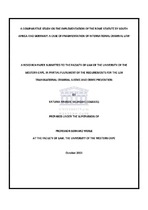A comparative study on the implementation of the Rome statute by South Africa and Germany: a case of fragmentation of international criminal law
| dc.contributor.advisor | Werle, Gerhard | |
| dc.contributor.author | Silungwe, Fatuma Mninde | |
| dc.date.accessioned | 2014-11-19T09:31:59Z | |
| dc.date.available | 2014-11-19T09:31:59Z | |
| dc.date.issued | 2013 | |
| dc.identifier.uri | http://hdl.handle.net/11394/3879 | |
| dc.description | Magister Legum - LLM | en_US |
| dc.description.abstract | The Rome Statute established the International Criminal Court (ICC). It provides that the Court is complementary to national jurisdictions. This entails that the primary jurisdiction over core crimes lies at the domestic level. However, in the absence of express provision for implementation, States have adopted different methods in the incorporating of the substantive and the procedural provisions of the Rome Statute. The German Code of Crimes against International Law and the South African Implementation of the Rome Statute Act considered under this study are indicative of the existing divergence. This paper argues that complementarity necessitates the divergence in approach. It further argues that the diversity is an issue of pluralism rather than fragmentation of international criminal law. | en_US |
| dc.language.iso | en | en_US |
| dc.subject | Rome Statute | en_US |
| dc.subject | Implementation | en_US |
| dc.subject | Fragmentation | en_US |
| dc.subject | Pluralism | en_US |
| dc.subject | Comparative Study | en_US |
| dc.subject | South Africa ICC Act | en_US |
| dc.subject | German CCAIL | en_US |
| dc.subject | Core crimes | en_US |
| dc.subject | General principles | en_US |
| dc.subject | Jurisdiction | en_US |
| dc.title | A comparative study on the implementation of the Rome statute by South Africa and Germany: a case of fragmentation of international criminal law | en_US |
| dc.rights.holder | University of Western Cape | en_US |

